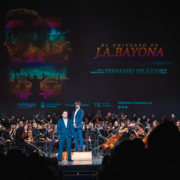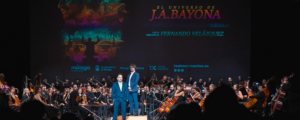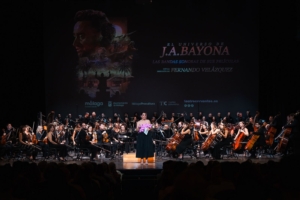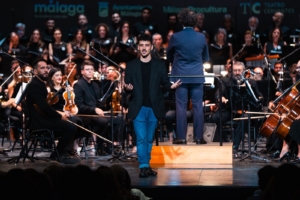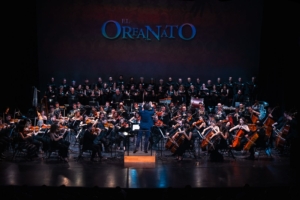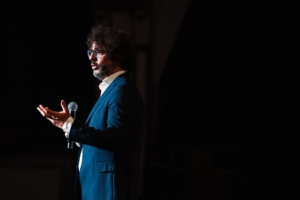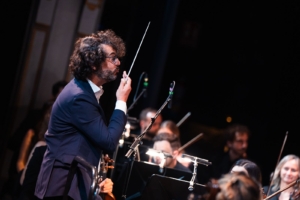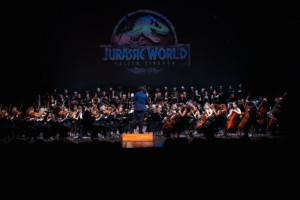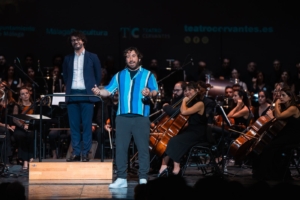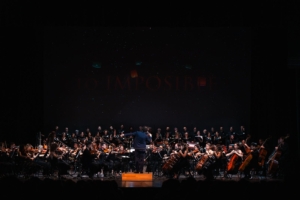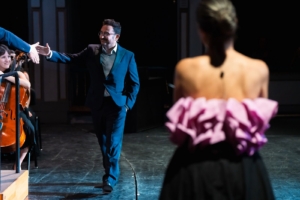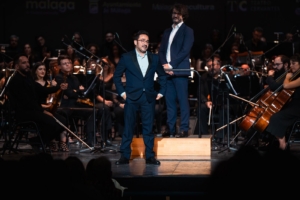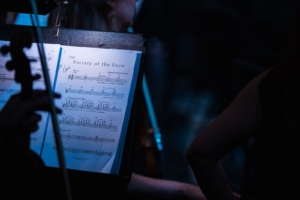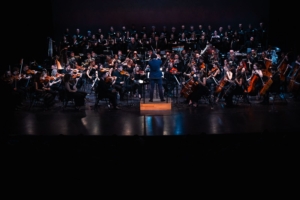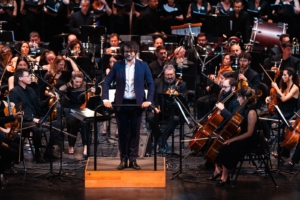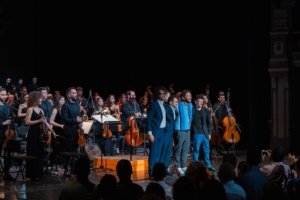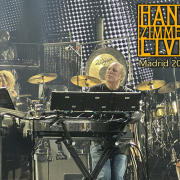Concert ‘The Universe of J.A. Bayona’ at the Teatro Cervantes in Malaga – Summary
On Tuesday, May 28, the director J. A. Bayona presented at the Teatro Cervantes in Malaga, Spain, a concert with his most emblematic soundtracks, performed by the Malaga Symphony Orchestra (OSM) conducted by Fernando Velázquez, with the participation of the Granada Chamber Choir and several guest stars (read more).
Our tireless collaborator Reme Diaz was present at the concert and together with the excellent photographs of Rafa Melgar bring us a special article as an exclusive for SoundTrackFest.
Bayona Universe or The Society of J.
If a few days ago the northern lights could be seen in Spain, something strange in these latitudes, last May 28 at the Teatro Cervantes in Malaga we had the opportunity to look into an entire universe: the Bayona universe. The acclaimed J. A. Bayona and his constellation of guest stars landed in Malaga to offer us a journey through the music of the Catalan director’s filmography, with composer Fernando Velázquez at the baton and the performance of the Malaga Symphony Orchestra (OSM) and the Granada Chamber Choir.
However, as we dived into that universe, we realized that more than a distant galaxy, it could have been described as a society, “The Society of J.” Because the “Bayona Universe” event was not just a concert but an experience where, through the music and the voices of the director’s collaborators, we verified that only surrounded by great artists and, above all, great people we can reach the top of the world.
Malaga journalist Celia Bermejo was in charge of hosting the gala, introducing the event and giving way to the different participants throughout the evening. Furthermore, after the first piece, the magnificent overture of “The Orphanage,” her voice over summarized the plot of the film. Something that we thought would happen in the rest of the concert but surprisingly it didn’t.
The first of the guest stars was Roger Príncep, Simon in “The Orphanage”, who, traveling through the memories of his experience with Bayona, told us how the director helped him discover his character through the game. As an anecdote, he also talked about how Bayona tried to teach him how to overcome the fear of watching the film during the preview (in fact the actor admits that he hasn’t yet been able to see it in completely). Something that he didn’t achieve, since he had his eyes closed throughout the screening. Of course, it helped him recognize the power of music to tell what we can’t see.
Afterwards, we enjoyed two more suites from “The Orphanage”, where the choir was able to demonstrate its strength and great power of voice and in which the orchestra brilliantly guided us through a recurring melody that changed from the melodic to the vibrant, from the disturbing to the sentimental and even childish. The music of this film occupied a large part of the concert, although it fell short for us due to the grandiosity of the composition and performance.
Without following a chronological order of the works, the second “constellation” of the Bayona Universe was “A Monster Calls”, which was introduced by Fernando Velázquez himself. This is, for now, the last collaboration of the composer with the director after a fruitful relationship that began with the short “The Sponge Man” and went through works such as the first one we heard, “The Orphanage”, or “The Impossible” (that we would hear later). Precisely those memories are what, in Fernando’s words, “led them to recognize the importance of magic in telling stories.” That enthusiasm and desire to tell stories is what has united the composer with Bayona since the beginning of their collaboration together.
In the “A Monster Calls” suite, we traveled through the different emotional states that we go through in the film, from a powerful beginning to the melodic nature of the main theme, from the heartbreaking, and the fear of loss, to the acceptance of life and death or what our place in the world is. The orchestra was once again up to the task of this demanding piece, with a perfection no less than Velázquez’s own orchestral direction, which, incidentally, vibrated throughout the concert with an energy and passion comparable to his own scores.
And just like that, without any further introduction, from one monster we move to another, if we can call the dinosaurs in “Jurassic Park” monsters. The suite from the music composed by John Williams sounded spectacular and was one of the moments where the brass section of the orchestra could shine the most. With high spirits, the composer Michael Giacchino appeared on the screen, leaving us a friendly greeting in a recording where he also emphasized his relationship with Bayona and the pleasure it is always to work with him. Once again, the universe became a society.
The time has come for “Jurassic World: Fallen Kingdom”, a Hollywood blockbuster to which J. gave his particular vision and to which he imprinted, apart from adventure, terror or mystery, his characteristic humanity. The orchestra sounded brilliant in a demanding suite from Giacchino’s soundtrack, which in its most melodic cadences even seemed to follow the same style of Velázquez compositions heard before, so that it combined naturally within the concert program. The Granada Chamber Choir also sounded great, emphasizing music full of feeling but at the same time, tragic and epic, with nuances of classic horror.
After the first hour of the concert, we traveled to Thailand and learn about the dramatic story told by “The Impossible”. Celia Bermejo reappeared to present the film and give way to screenwriter Sergio Sánchez, a regular collaborator of Bayona, who replaced María Bellón, who covered this testimony in the previous concert in Barcelona (read special article). Sergio confessed that the protagonists’ hard experience came to him at a very difficult moment, and his words full of emotion left us with a lump in our throat.
The following two suites of the movie made that lump bigger, so as the wonderful composition by Fernando Velázquez (for us his masterpiece among all the works composed for Bayona’s films) took us even more to those words of Sergio about the people who survived and those who left but will always be with us. In this heartfelt piece, we’d like to highlight the cello soloist, who has so much weight in the score, and the intimate and meditative character that both Velázquez’s direction and the OSM’s interpretation brought to the suite. Curiously, behind the stage we could see Bayona recording the suite with his cell phone, giving us a glimpse of how he presents his sequences in the films, on a small scale, of course. Being an excellent film director is great to see he’s also brilliant even in these home recordings.
We reached the end of the concert with “The Society of the Snow”, but not before receiving, again introduced by Celia Bermejo, the protagonist of the evening: J. A. Bayona. After a standing ovation and the audience standing in the theater, the director thanked the attendees for their presence, as well as the Teatro Cervantes (which he has special affection for hosting the Malaga Film Festival every year) and, of course, the orchestra, choir and Fernando Velázquez. In fact, the admiration and great friendship that bonds Fernando with J. became evident when, with his voice breaking with emotion, he gave him a few words of gratitude and a big hug.
Regarding “The Society of the Snow”, Bayona told us some information about the filming and, as an anecdote, he confessed his recurrent answer to all those people who asked him why he repeated a story that had already been told: this particular story had not yet been told, not by the protagonists of the accident. Giving a voice not only to the survivors but also to those who never returned, from their life experience and perspective, as members of that “society” that emerged as a result of that tragic moment.
The beautiful suite from the soundtrack, composed by Michael Giacchino, covered several key moments of the film, from the main theme to pieces like “Andes Ascent” or “Found”, where the choir shone again as the hope of the survivors of being found alive. Through the orchestra and under the baton of Fernando Velázquez we could feel the cold of the snow and the loneliness of the mountains, the camaraderie between the survivors and their sacrifice for others. With the image projected on the screen of the crashed plane in the snow of the mountains, approaching us little by little, we were reliving the moments of the film in our imagination and we felt that roller coaster of emotions that its music also takes us on.
After a long and great ovation at the end of this piece, the composer announced to us that we would have not one, not two, but three encores, although not very long ones. We began with another very powerful and intense theme from “Jurassic World: Fallen Kingdom” (both on an orchestral and choral level): “Shock and Action”.
We continued with the theme of “The Secret of Marrowbone”, produced by Bayona and directed by its scriptwriter and guest of the night, Sergio Sánchez, who let us rest for a moment among so many emotions with his melodic composition that reminds us of that childish innocence about to be endangered by the events of the film.
The last encore, “to close the circle” as Fernando Velázquez said, was the soundtrack of the short film that began his collaboration with Bayona, “The Sponge Man.” Similar to “A Monster Calls” (as Fernando himself recognized, although with romantic or adventurous moments), with its apotheotic ending we finished absorbing the entire cinematographic and musical universe that had accompanied us for almost two hours.
A universe that, as we said at the beginning, gave a good account of friendship and the sense of belonging to a society that, on that evening, was formed not only by Bayona but also by the guests, the Malaga Symphony Orchestra, the Granada Chamber Choir, the composer Fernando Velázquez and a devoted audience that thoroughly enjoyed it.
A universe that we hope would be infinite.
Article by Reme Díaz
Pictures by Rafael Melgar

